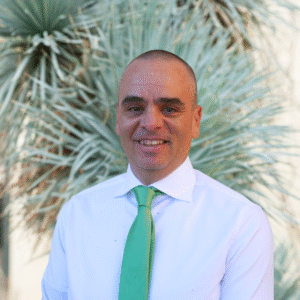Dave James, ND, discusses how stress, nutrition, movement, environment, and emotional health all influence aging.
 Bio: Dave James, ND, is a licensed naturopathic physician in Connecticut and Arizona and a proud alumnus and former Board of Trustees member of Sonoran University of Health Sciences. Dr. James focuses on chronic pain and supportive care for persons with a diagnosis of cancer, including survivorship. He now delivers CME presentations alongside patient care. Deeply committed to public health and equity, Dr. James is a passionate advocate for expanding licensure for naturopathic physicians nationwide so that all patients—regardless of socioeconomic status—can access high-quality, evidence-informed integrative care. He believes the doctor–patient relationship is sacred and central to healing.
Bio: Dave James, ND, is a licensed naturopathic physician in Connecticut and Arizona and a proud alumnus and former Board of Trustees member of Sonoran University of Health Sciences. Dr. James focuses on chronic pain and supportive care for persons with a diagnosis of cancer, including survivorship. He now delivers CME presentations alongside patient care. Deeply committed to public health and equity, Dr. James is a passionate advocate for expanding licensure for naturopathic physicians nationwide so that all patients—regardless of socioeconomic status—can access high-quality, evidence-informed integrative care. He believes the doctor–patient relationship is sacred and central to healing.
- Can you tell us a little bit about yourself and your background?
I’m a naturopathic doctor, lifelong runner, and nature lover. My journey has taken me from elite ultramarathons to medical school, and now into clinical practice where I blend modern science with the innate healing wisdom of the human body. I’m a proud alumnus and former trustee of Sonoran University and currently a full-time clinician at Naturopathic Specialists, LLC in Scottsdale, Arizona.
- What initially drew you to the field of longevity and health span natural medicine?
As an athlete, I was always fascinated by pushing the limits of human endurance. Over time, I began to shift that same curiosity inward—how do we maintain performance, clarity, and vitality through midlife and beyond? As I move from the “fall” into the “summer” of life, I’m passionate about supporting others on that same path using natural, sustainable strategies.
- The biological mechanisms of aging are complex; can you briefly summarize the main known biological mechanisms driving aging?
Aging is driven by interconnected processes: oxidative stress, immune system decline, mitochondrial dysfunction, cellular senescence, and telomere shortening. From a naturopathic lens, we see the cell as a microcosm of the whole person—stress, nutrition, movement, environment, and emotional health all influence aging at a cellular level.
- What role does genetics play versus lifestyle in determining how we age?
There’s a saying I resonate with: “Genetics loads the gun, but environment pulls the trigger.” I believe that deeply. In my 30s, I competed at a high level while managing stress and sleep well. Ironically, medical school and the pandemic disrupted that, which reminded me how essential those basics are. Now I make conscious choices daily to lower stress and support resilience—true longevity comes from within.
- How do stress, sleep, and mental health impact aging physiologically?
Deeply. Social connection, restful sleep, and mental health are pillars of longevity. Chronic stress and poor sleep accelerate inflammation and immune dysregulation. As a runner, recovery was everything. As a physician, I help patients unplug and re-engage with real-life relationships. These are not luxuries—they’re essentials.
- How do you measure biological signs of aging on a routine basis?
I go beyond routine labs. While a CBC and CMP are starting points, I use specialized panels for inflammation, cardiovascular risk, and cellular aging depending on the patient. There are exciting assays becoming available that provide a more nuanced picture of biological age, especially when interpreted within a whole-person framework.
- Are there any interventions—lifestyle, supplements, or therapies—that have shown meaningful benefits in increasing health span?
Yes, and I look forward to diving into the evidence. Many trends, like cold plunges or red-light therapy, have roots in natural practices—like post-run stream dips I used to do in icy mountain waters. But we must separate hype from science. I’ll walk through what has strong clinical backing and where caution is warranted.
- What lifestyle changes have the strongest evidence for extending health span?
Movement is medicine. At ASCO 2025, data confirmed that exercise prescriptions led to better outcomes, even in oncology care. When motivation is a barrier, working with a physical therapist or trainer can be transformative. Sleep, nutrition, community, and a sense of purpose also consistently correlate with increased longevity.
- Are there any healthy aging dietary supplements that you’re optimistic about?
I believe food is medicine, first and foremost. But I do use and cycle certain natural medicines based on patient needs and current research, especially those that support mitochondrial function, inflammation modulation, and cellular energy. Nutraceuticals can be effective tools, but they must be personalized and clinician-guided.
- Where can people learn more about your work or connect with you?
Dave James, ND, Licensed Naturopathic Physician, PLLC at Total Care Naturopathic Medicine (CT&AZ)
Available via email at rundavejamesnmd@gmail.com, by phone at 928-326-3487, and at www.rundavejames.wordpress.com.
Or connect with me on LinkedIn:
Follow me on social media at @rundavejames and @https://www.instagram.com/davejames_nd/ — I’m always sharing insights on longevity, integrative oncology, and natural resilience.







Comments (0)